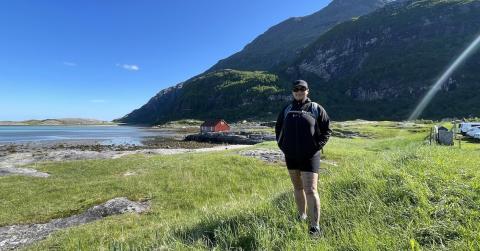
NPM PhD scholar Waratah Taogaga (Ngāti Whātua, Ngāpuhi, Barkindji (NSW), Ngāti Hāmoa) travelled to Norway in June to present her research at the NAISA Indigenous Studies Conference.
Waratah’s research, ‘Hua o te Kawariki’, explores how iwi mātauranga can help to develop knowledge to aid the establishment of Te Kura o Ngāti Whātua ki Tāmaki. The iwi hopes to eventually create an ecosystem of kura throughout the rohe and her PhD research supports this aim.
Waratah has been working to identify knowledge that Ngāti Whātua believes is important for the coming generations. Wānanga have been crucial to the gathering of this information and Waratah has interviewed multiple mātanga from Ngāti Whātua on questions about mātauranga a iwi as well as specific intergenerational pedagogies of Ngāti Whātua.
She expects her findings will not only highlight the need for Ngāti Whātua kura, but also provide viable evidence, suggestions and groundwork that can actively contribute to the vision, design and creation of tribal curriculum. Once a kura has been established at Ōrākei, this will support the eventual creation of a wider ecosystem of tribal kura throughout Ngāti Whātua takiwā.
“We view an ecosystem as learning and growing with each other, whereby those kura reflect the identity of that takiwā,” she says. Once these kura have been established, there is a vision that tauira might travel between each takiwā (Ngāti Whātua have four in total) to learn about the unique mātauranga of each territory. For example, they might travel from Ōrākei to Kaipara, or Maunganui to learn about their environment and mātauranga reflective of those environments, whether it be ahu whenua driven, or moana based.
Waratah believes kura that are immersed in mātauranga specific to their hapū and iwi are important. “Kura that have our own mātauranga reinforce and support the spiritual, mental and physical wellbeing of our Tamariki, as well as teaching them the importance of whanaungatanga, ultimately contributing to their identity.”
“My dream is that Ngāti Whātua uri will be standing proudly on our marae, being in roles of significance in addition to the marae, including being successful in their various spaces proudly knowing who they are and who they descend from as Ngāti Whātua.”